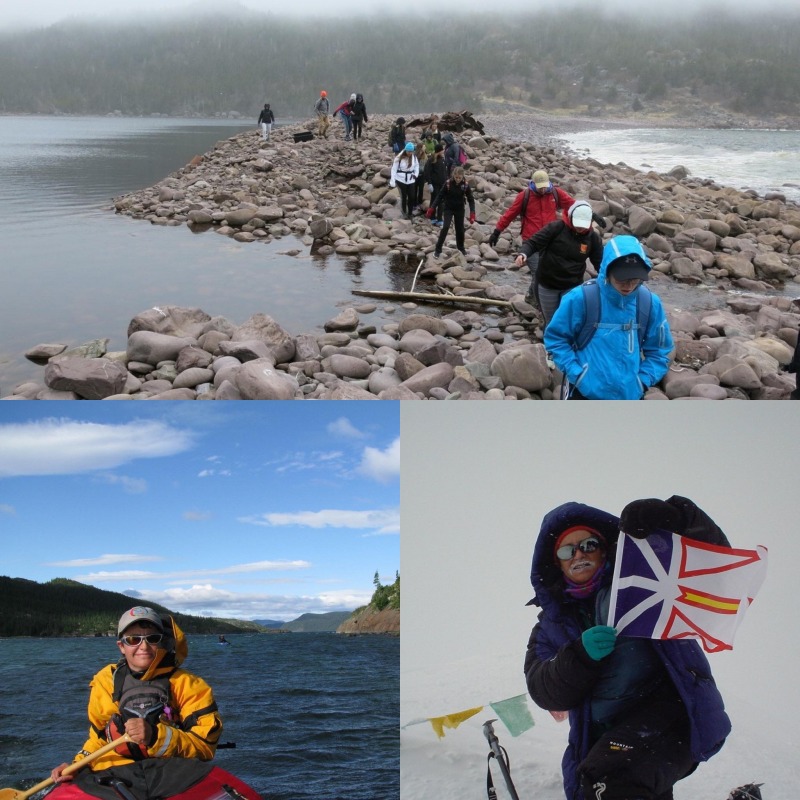Improvise, Adapt & Overcome

TA Loeffler is closing in on her 25th anniversary as a professor at Memorial and in many ways, she has experienced it all. TA has been to 52 different countries and all seven continents, but when the global pandemic hit, even she had to adjust and try and figure out a way to offer her outdoor intersession courses inside.
TA Loeffler held two courses from May 11 till June 19, and the first was:
Introduction to Outdoor Recreation and Education (HKR 2545) which was attended by 31 students. This course gives an overview of the foundational principles of outdoor education and recreation as they pertain to philosophy, wilderness ethics, professional preparation, movement through wildlands, environmental hazards, navigation, and safety. Students participate in a sampling of outdoor education and recreation activities during the course including a three-day field trip. HKR 2545 is usually taught entirely in the field except for the first 30 minutes- in locations all over the Avalon.
The second course was:
Inclusive and Therapeutic Recreation in Outdoor Settings (HKR 3515) which was enjoyed by 34 students. This course provides an introduction to current philosophy, issues, and practices relating to inclusive and therapeutic recreation in outdoor settings. It is designed to provide students with the knowledge and skills necessary to practice inclusive and therapeutic recreation in outdoor settings. HKR 3515 is usually half in the field visiting various community agencies doing inclusive/TR outdoor recreation and a half in the classroom.
So how was possible to put two almost entirely outdoor courses indoors in just 5 weeks’ notice time?
She gathered her friends and colleagues from 7 nations and 3 continents, and they put together some ideas. With some feedback from them, and 5 long weeks of putting together all the materials, digital media, documentaries. One of the main challenges was designing practical learning tasks that could be completed by students wherever they were, with whatever materials they could gather at home. For example, working on knife skills is a key aspect of the course. While some students might not have carving knife at home, they might have a pairing knife. And maybe they don’t have access to a stick of wood, but instead they could substitute that for something they have in their fridge, like a carrot.
She was working day and night to think of all the things that might be interesting and useful for students. TA is a person who loves the outdoors, she is a climber and keynote speaker. After climbing Mount Denali, she set a goal of climbing Mount Everest and the rest of the seven summits, the highest peaks on each of the seven continents.
Besides her several publications, scholarly presentations, and media coverage, she also co-edited the fourth edition of the Theory of Experiential Education.
This situation wasn’t ideal for anyone, but for sure it was challenging for TA since the courses she teaches are entirely based outdoors.
TA took lemons and made lemonade. Even though she was quite sad that students had to forgo the traditional offerings of the two courses, she witnessed some of the good things that COVID-19 did to all of us. Students involved their parents, cousins, siblings, nieces, and nephews in their practical learning sessions. She read some of the finest writing in the papers they sent.
“The students worked hard. I worked hard. And other than not having a pandemic and getting to teach the courses in typical fashion, I’m very pleased with my and the students’ pivot to make the best of a very hard situation for these courses,” said TA.
For the past 25 years, she invited students to use their creativity and knowledge to solve many challenges she placed before them. The way she asked them to critically examine the world around them and their many roles in it, to challenge them to learn new knowledge and skills and push their limits further than they have before. The result was an intense focus and lively discussion.
This is exactly what she did now. She taught them how to use things they have around their house and how to do their tasks with family members, which is one of the good things that this pandemic did to us. Brought us all together, and taught us how to cherish moments we had to spend inside.